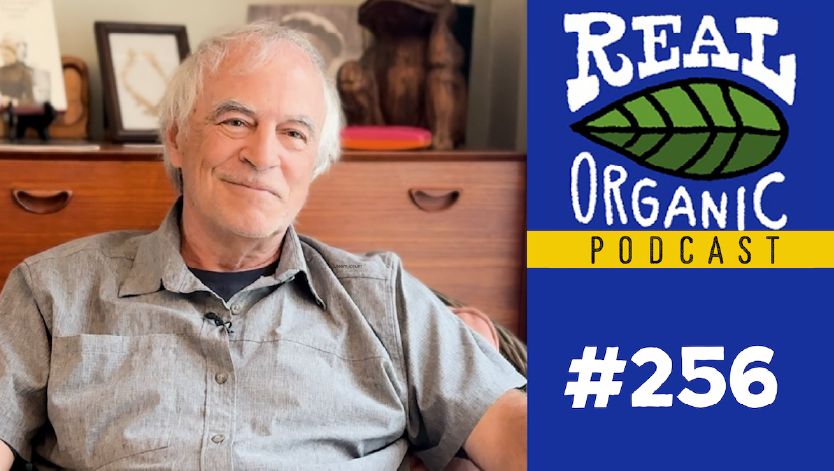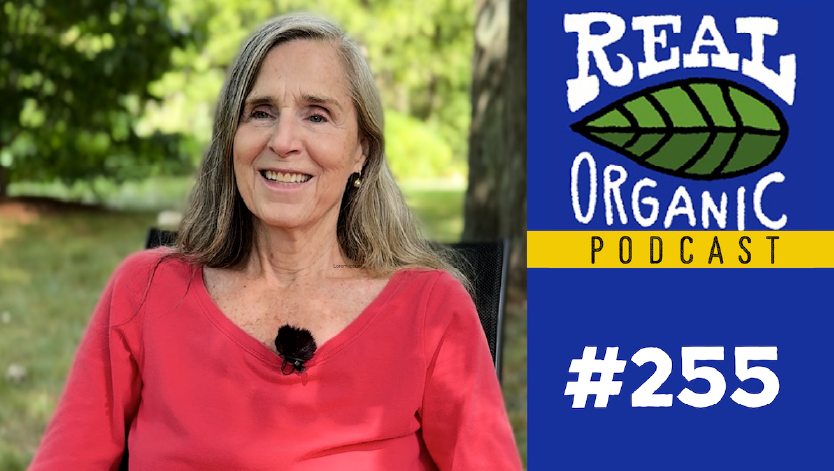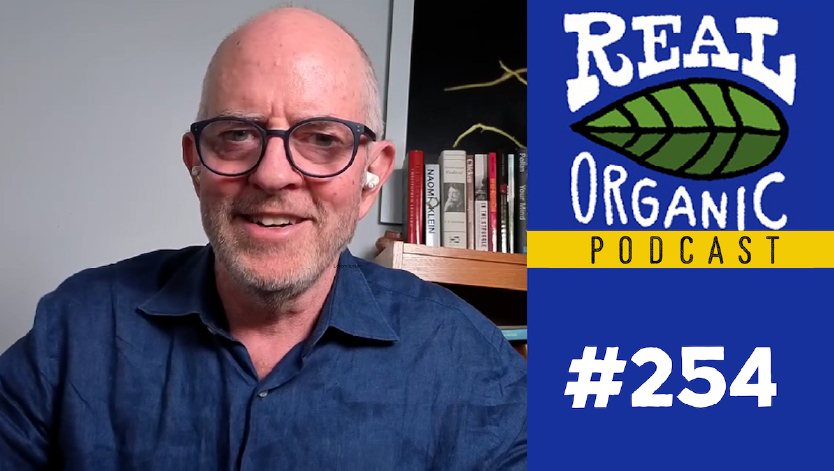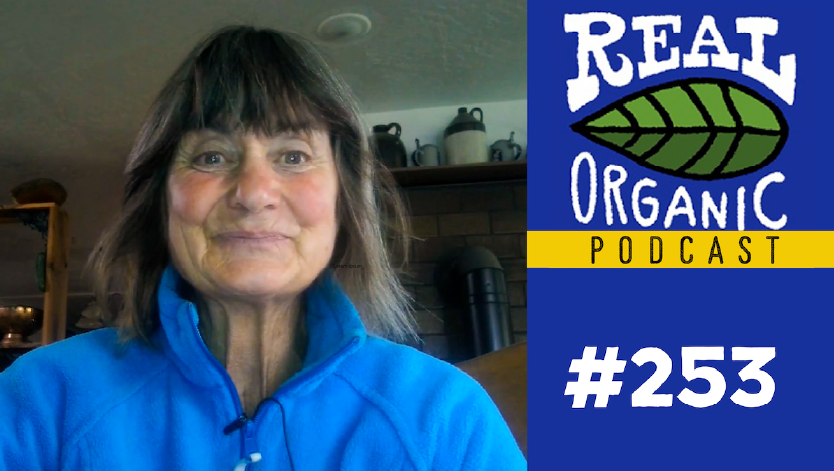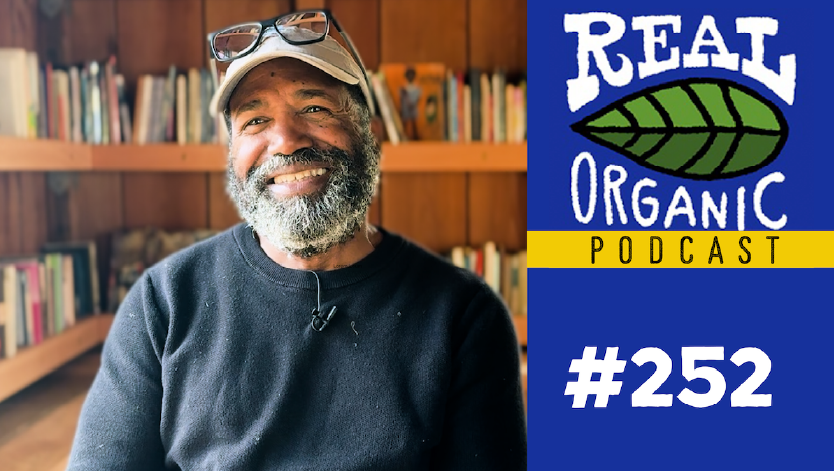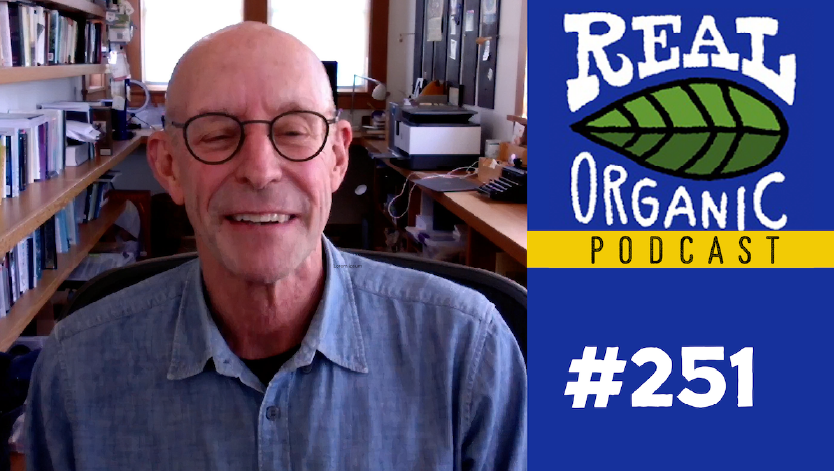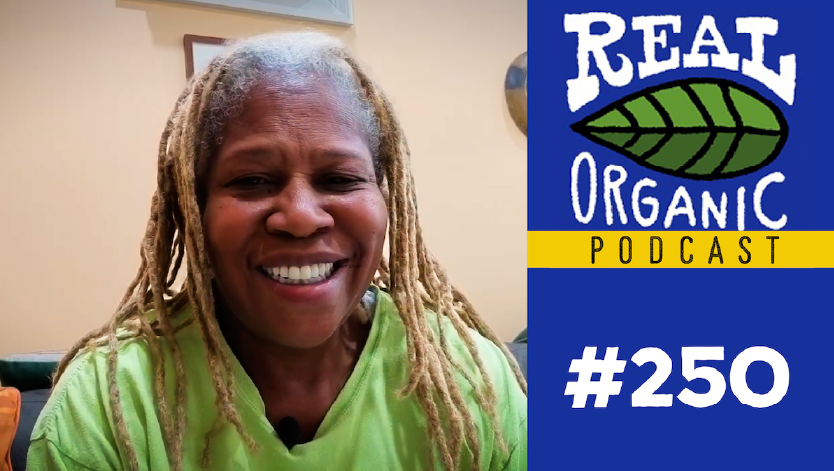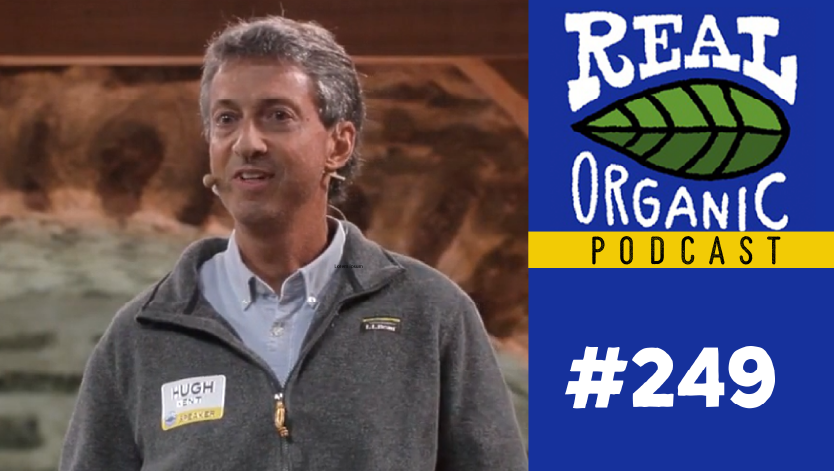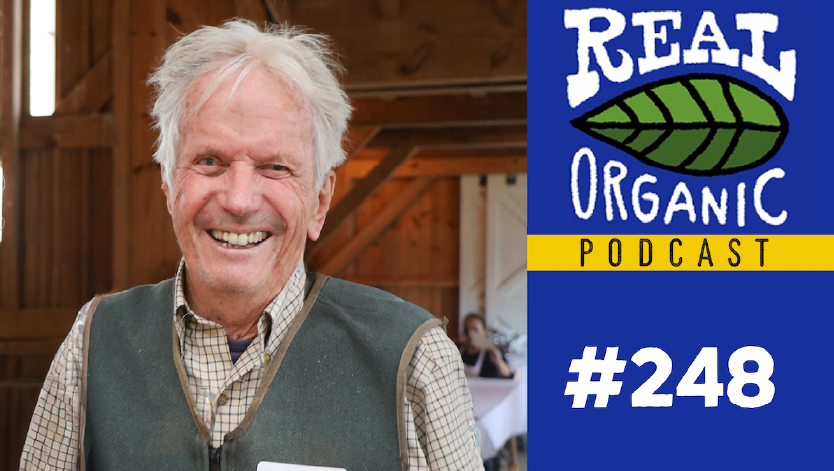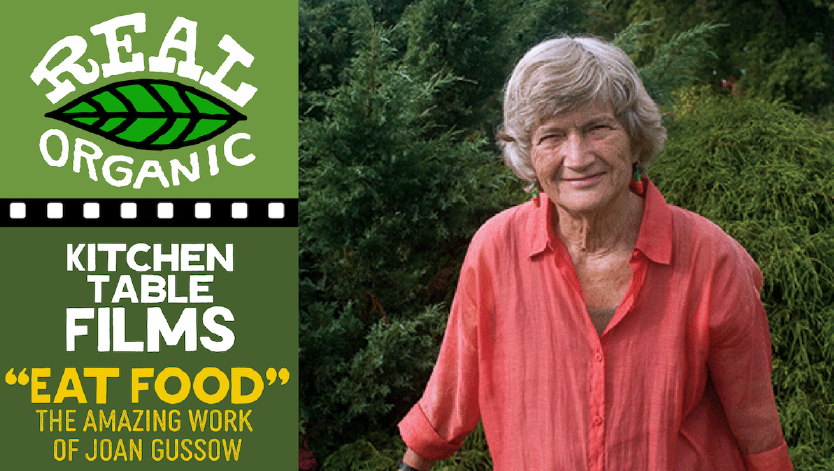Episode #182
David Bronner: Origins of Regenerative Organic Certification
Welcome! You can subscribe and download episodes of our show through your favorite podcast app.
You can also subscribe to receive the video version of each episode on our YouTube channel.
Our David Bronner interview has been edited and condensed for clarity.
Dave Chapman interviews David Bronner, December 2022 :
Dave Chapman 00:00
So welcome everybody to the Real Organic Podcast. And I’m talking again with my friend David Bronner out here in Vista, California. David, we’ve talked for some years now. I asked to talk again, our symposium this year is going to be addressing the question that’s come up a lot, I get people asking all the time now “is organic, regenerative?” And the second question I get is, “is regenerative organic?” And, you know, it’s become huge because there’s been such a massive embrace of the term regenerative by the corporate giants who define big ag and big food. This has happened in breathtaking speed, as I’m sure you’ve been watching.
Dave Chapman 01:06
So I think you’re one of the people who has thought the most about this. And I’d like to ask you, if you could to start, you’re one of the founders of the Regenerative Organic Certification. Tell me a little bit of the creation myth. How did how did that come to be? Whose idea was that? What happened?
David Bronner 01:30
Yeah, well, I think the answer that question I think we agree, and I think a lot of people agree with us, that are true organic farmers and true regenerative farmers, which means that organic should mean regenerative and regenerative should mean organic. Unfortunately, the reality is that when organic became enshrined as a set of regulations, that the spirit of organic was often lost and increasingly, as big corporate players came in, and inorganic regulations are kind of more about what you shouldn’t be doing. Like you shouldn’t use this synthetic fertility or that synthetic pesticide, but it wasn’t codified what you should be doing, which is whether regenerative like, you know, what you should be doing in an organic farm is doing regenerative practices, organic practices.
David Bronner 02:27
There’s a lot of overlap, cover cropping and actually fixing cover crops and smart grazing practices and smart rotations. We understand what’s a heavy nitrogen feeder and what can fix it, nitrogen before that, and match that with market demands. And it’s complex, primitive planning for pollinators and predatory insects for insect control.
David Bronner 02:52
You know, there’s there’s a lot of things that go into a real good organic farm, a really good regenerative farm, a really good biodynamic farm. I mean, they’re all terms that should mean a farm that’s an organism, it’s understood that it’s living and you’re generating fertility on the farm, you’re not bringing fertility in from off farm. So unfortunately, a lot of the big organic corporate farms just kind of sit. Instead of synthetic nitrogen, they’re just bringing careful maneuvers and by the truckload, just kind of input substitution and not really doing regenerative practices on their farm and building carbon in the soil and doing the things that good organic farmers do.
David Bronner 03:34
And in regenerative, on the regenerative side is this term that should also mean, regenerative means building carbon in the soils, I guess how a lot of people define it. But it should also mean in building fertility on your farm without relying on synthetic fertility. To me, that’s definition one of regenerative. Like, if you’re not doing that, if you’re bringing in synthetic fertility, then that’s a contradiction.
David Bronner 04:01
And especially when we’re talking about climate change and addressing climate change. So it’s like a real joke to me when regenerative people who are adopting that moniker are relying on synthetic fertility, since nitrogen fertilizer is like the number one greenhouse gas, both in the creation of it and then in its downstream effects, it is the number one contributor in agriculture to climate change. So to be in a regenerative “system,” and rely on synthetic fertility is, you know, that’s ridiculous. And so I think regenerative and organic, should go together. And in fact, the really good organic farmers are regenerative.
David Bronner 04:42
The Genesis, the creation story for Regenerative Organic is we started to see organic, increasingly kind of go sideways. And the really good organic farmers were competing against these huge CAFOs and huge corporate farms and they were, you know, kind of inside the letter of the law but violating the spirit. So the Regenerative Organic standard was a way to address that, and basically a shrine for not just we don’t do, but what you should be doing on a farm and you know, just kind of bringing the practices that good organic farmers are already doing and in training that in regulation and then also bringing in high level animal welfare criteria.
David Bronner 05:21
Again, a good organic farmers doing a more pasture based system, so codified pasture based livestock in, in regulation. And then on the social fairness side, making sure that the labor on a farm is treated fairly, safe, well compensated, or decently compensated. So just kind of bringing the best of soil health and fair labor and animal welfare into a single consumer facing standard.
Dave Chapman 05:50
Yeah. You can’t help but walk around your company, Dr. Bronner’s, and your commitment to social welfare, both of the people who work there, and the people outside of the company, that you’re trying to serve the people of the planet. It’s very, it’s very obvious. And it’s, it’s everywhere, that commitment is everywhere. And I making a call out here, because I really respect it. It seems like the things that you describe as organic and and you’re using the term regenerative, but actually they’re just organic. I mean, those were the things that organic meant when it began,
David Bronner 06:38
yeah. Yes, that’s where they came from. That’s right.
Dave Chapman 06:42
Yeah. And the first time that I’ve heard of the term regenerative being used applied to agriculture was by Bob Rodale. Yeah. Did you? Did you ever meet him?
David Bronner 06:53
I didn’t. But Jeff, sent me some of his original writings. And and yeah, that’s a really good point. I mean, that rejected, I mean, it was termed out of the organic movement.
Dave Chapman 07:04
Yeah. What do you think he was trying to get at Bob, do you think you’ve read some of his writings? What was he trying to get at when he used that term? Regenerative, because really, he started to use it. I think it was just maybe two years after the organic food production Act passed. So it was really early in the growth of organic. And there was something that he was trying to get at what do you think that was? Oh, it was getting lost?
David Bronner 07:34
Yeah, well, I mean, I think the way he he meant it, as far as practically on the ground was the soil, you leave the soil better than when you found it, like every year that the soil is benefiting from your agricultural practice, you’re making it more healthy, or building the microbiota and make it even more awesome. And, you know, versus like treading water with quote, unquote, sustainability.
David Bronner 07:58
And I think to your point, or even like, obeying the law, but your soil is now kind of starting to go to crap, and you’re reliant on more and more off farm inputs to bring your crops to market and you’re kind of cashing in on the organic program without actually doing the practices that truly regenerate soil, regenerate rural economies, regenerate. livelihoods.
Dave Chapman 08:26
You know, what went when when I talked to I interviewed Larry Gary Hirshberg, for our milk session last year. Yeah. From stony field and, and he knew Bob and he talked, walked around the fields with him. He said, he thought that Barbara Dale’s idea was really, for him regenerative was more about bringing back social justice to the organic movement, because he thought that was the piece that was maybe getting lost in the beginning. There was still everything about the soil was still there, and everything about animal welfare was still there. But in the in the law and the organic food production Act, there really wasn’t anything about the social justice that was very much a part of the organic movement.
David Bronner 09:15
Yeah,
Dave Chapman 09:16
no forgot to law.
David Bronner 09:18
Yeah, well said and I know Jeff Rodel. Now, I mean, he often says like, you know, treating earthworms with respect is, you know, not not enough and you know, we got to make sure the farm workers and and and that makes sense that Bob Rodale was speaking in a regenerative lingo to encompass the social welfare piece, and you’re right, I mean, they’re getting movement when it was a movement was a holistic program of, you know, not just land management and agriculture, but yeah, treating people right and being in relationship with your customers who understood that they’re paying a premium for food that was grown right in a price that enabled you to take care of your land and your people in the right way. And yeah,
Dave Chapman 10:01
yeah, well, when when I was young, and and, you know, I, I graduated high school and 71 was the very last year of Vietnam, and all of that turmoil and ferment. And the movement that grew out of that that did change America. Organic at that point was very much a political movement. And I don’t mean, Democrats or Republicans. I mean, it was political, in a sense of trying to change how we live, how we relate to each other, how we relate to the earth, how we relate to food, all those things, were kind of up on the table saying we need a different way. Yeah. It and, and I, that’s what the real organic project is trying to do. And I believe that’s what regenerative organic certification is also trying to do the same thing in that in that,
David Bronner 11:01
yeah, yeah. Right. It’s a much more of a commitment to global view of social and economic and ecological welfare. You know, not not just looking at it as like, some piece that you do sometimes, you know, sometimes we’ll do that sometimes. Right. You know, do whatever. But it’s a whole life commitment to a different way of living that now, I think, yeah, I mean, I mean, the hope and dream is that, you know, globally we can shift and so much of the energy flows in the on the planet is that through the human ecosystem, and our human directly through our mouths, and through our beings, and just the world that we’re creating out there and complicit with these corporations that want to keep us ignorant, and a lot of us don’t really want to know, just really, you know, just not to be bothered.
David Bronner 11:58
But yeah, it’s just creating a disaster and in the on the world, and yeah, I mean, the movement. Yeah, I mean, it was moving like we we want to change we want to transform that we want to transform and the simpler lifestyle and harmony with the earth and each other. Yeah.
Dave Chapman 12:19
So when when this started when the regenerative organic certification began, who went to who? I’m just curious, did did did you go to Rodale and Patagonia, or did did Jeff go…?
David Bronner 12:34
Yeah well, you know, what, there is like a pretty spicy online just kind of debate going on, you know, and between, yeah, organic and even I was like, do different like kind of people in said regenerative tent were very critical of organic and that in the way they were organic is and we are, you know, just kind of pointing to over tillage and reliant on CAFO manures and not built you know, critiquing say corporate organics, but then conflating that with real organic or like, you know, trying to like lump everyone together and not like acknowledging real organic in India, vice versa, you know. Arran Stephens, and Jeff, myself, Rose, you know, saying, okay, like, so awesome, you’re very good critique there.
David Bronner 13:29
But if regenerative quote unquote farm is reliant on synthetic fertility and nitrogen and is making climate change claim, it is ridiculous and hypocrisy, you know, totally hypocritical and regenerative needs to be organic. And especially in herbicide weed burning down with Roundup as your no till strategy, and, you know, it’s just like, This is not regenerative vision. And, you know, it’s it’s internally contradictory. It’s not, you know, if using synthetic fertility in Roundup, I mean, that’s not regenerative.
David Bronner 14:00
And so, yeah, so it was basically a way of like, kind of seeing that regenerative was gonna go the way of sustainability and we and and, and that there was also hope of kind of rescuing organic in a way. Yeah, putting it together. Yeah. So yeah, so I guess kind of a few of us, I think, organically, and yeah, it was rose from Patagonia and Jeff modell myself. I think we’re the you know, kind of initial seed that grew out of an online dialogue or debate.
Dave Chapman 14:33
Yeah, an exchange of ideas. I imagine that got a bit heated.
David Bronner 14:37
Somehwat heated, but you know, there are so many good points on all sides. Yeah. And in the blog, I wrote Regenatarians Unite. And I do mean, Gabe is a superhero. I mean, I think he’s doing a lot of amazing things and as are other you know, individuals and I think we all can learn from each other but ultimately it needs to come together and regenerative organic vision and But yeah, it was it was rose, me and Jeff and then we brought in Dana Geffner from farewell project. Oh, Leah Garcés from Compassionate Farming. She’s now moved on to Mercy for Animals, but conventional farming was a real partner an animal welfare side and it’s been doing really good work on on the gap Global Animal partnership development and you know, just promoting better, more humane livestock practices not but not in this, like, you know, total total vegan, you know, livestock is is wrong is more much more like, there’s, there’s good and bad and we’re up promoting the good.
David Bronner 15:46
And so they were just really good and coming in and helping us to find the pasture based livestock criteria and, and which, which mostly, you know, honestly, uh, we’ve got our criteria, but mostly we rely on third party certifications, it was more like, Okay, who meets a bar, because there’s so much crap out there, you know, so it’s just like, Okay, we’re gonna say, you know, animal welfare approved, we’re gonna say, Certified Humane pasture level is like two levels that certify the main and then gap four and above, you know, that’s kind of like where the center of gravity is on the animal welfare side. And then on the Fair Labor, yeah, you know, relying on mostly for existing high bar Fairtrade certifications for international but realizing pretty soon that domestically there really wasn’t a viable partner, or they had any real traction or kind of workability. So then we just developed our own and had been working through the pilot to refine that and make it work for for farmers and but still be meaningful, obviously, for farm workers who are the primary stakeholder? Yeah,
Dave Chapman 16:53
yeah. That’s great. Okay. So, back then, it was a discussion at that online debate that they got spicy. And as you say, that there were really well meaning people on both sides of that debate. And, you know, when I first heard of the regenerative movement, and, and, you know, the mid, it was a Midwestern thing. And, and it was described to me that it was tribal, that those people would never become organic, because they would be embarrassed to be organic, because it was not part of their culture. And it was like, you know, nobody would speak to them at the coffee shop anymore if they were organic, and which is, which is true, I we certify lots of Midwestern organic farms, and
David Bronner 17:48
they get ostracized,
Dave Chapman 17:49
man they get they, they get ostracized, you know, they get vandalized, you know, people won’t talk to them anymore, passing them on the street. It’s, it’s intense, we forget on the coasts, that there’s a big middle America and being organic is perceived as being an assault on somebody’s way of life. Yeah. And, you know, that way of life is, is, you know, there’s all this hidden persuasion of who we are. And I think it’s often very calculated by by corporations who are making a lot of money off that system, but they’re very effective at at persuading people that somehow it’s unAmerican to be organic. Yeah, no, totally. And it’s a terrible thing, because it closes down that doorway, which, which those companies are terrified of. Yeah, because they make their money selling, you know, chemicals and fertilizers to those farmers. That’s exactly how they make their Yeah,
David Bronner 18:56
no, no, you’re getting some pretty key here. And and, I mean, honestly, they kissed the ground. So it’s like a thing here, where it engaged. I mean, it’s, you know, he’s pretty honest. He’s like, look, I mean, no chemicals is the goal. But if we call it organic, you’re just not, you know, the conversation stops, you know, like, it’s more like, you know, what’s the bringing the regenerative and, you know, lower than, Hey, you don’t need to spend that much money on synthetic nitrogen, you know, that kind of putting these economic terms, you know, putting it into this organic philosophy of, of, you know, less harm on the earth, and how do we, you know, it’s more kind of more economic interests. And, yeah, and, you know, more in that frame, and, you know, and, you know, don’t talk about climate change too much, you know, and like, you know, you know, what I mean, it’s like a different conversation, but in a way, like, trying to get move people along a path and
Dave Chapman 19:49
now they know they like to talk about climate change in the Midwest because they’re about to get billion dollars from the government. Right? You know, it’s well thought Whatever, you know, I heard a rare Chilika being interviewed by Al Gore, I told you about that conference. And Ray said something that was so interesting to me. He said, You know, I used to try and take on the chemical companies, I used to tell the farmers, you know, you, you need to use less chemicals. And he said, I never made any progress. But since I started talking about regenerative, I’m making lots of progress, because it’s actually no longer that threatening to those chemical companies. And so they can speak about it as the positive of including, you know, green manures and cover crops, but not necessarily saying you should stop using Roundup. And I thought that was so interesting that that something better is happening, but at the same time, bear Monsanto is winning. Yeah, they start to actually sculpt the conversation.
David Bronner 21:08
Yeah, I mean, yeah, I mean, I love rain. And yeah, he’s a wonderful Yeah, yeah.
Dave Chapman 21:13
We all love right. Yeah, I sit and talk to Rick, listen to Ray anytime I get a chance.
David Bronner 21:18
No, no. And, and I think he, you know, he definitely wants to, you know, see, you know, he totally sees the problem in a mega way and chemical stranglehold on that policy and, and we actually finance a film dominion, a short film, featuring rain, and he really wanted to talk in that kind of Christian idiom, to his fellow farmers and is really amazing. And I think it’s on the circuit. I was just hearing, you know, it’s, it’s kind of surprising, like, Oh, you didn’t even like, show me till and I guess it’s, it’s out and about, but it’s, it’s pretty rad. It turned out in a really good way. Pretty intense. You know, it’s almost like a Peta film, actually, but you know, I mean, juxtapose with like, beautiful scenes of like, grass fed, you know, cows, you know, in proper rotation and living a beautiful life. You know, but then juxtapose was like, Wow, man, this is like some hardcore slaughterhouse careful. Footage. Oh, my goodness. And yeah, so, you know, he’s doing the good work. But yeah, I think, you know, he’s strapped, you know, he’s just like, Okay, how do you take on the machine? You gotta kind of like jujitsu it and yeah, figuring out your path. And yeah,
Dave Chapman 22:32
I have great respect for Ray, I have great respect for Gabe. And, and they’re doing, they’re doing great work. But I don’t always agree with them.
David Bronner 22:40
Yeah, well, and right. I mean, they’re, you know, they’re kind of prioritizing, like, Okay, well, let’s, we can get this good. You know, if we can get everyone cover cropping, then that’ll be awesome. And if they’re still using Roundup, well, you know, least it’s better than before, you know, and, you know, and I think they’re more incremental and trying to engage new standard, right? It’s kind of like a incremental thing. It’s like, you know, you got to make these progresses. along the chain. And it’s interesting. I haven’t actually, it was a while ago, I’m not sure its highest level, but hopefully, it’s more or less a regenerative organic level. You know, no chemicals.
Dave Chapman 23:20
That what is
David Bronner 23:21
Gabe’s standardsm , Gabe launched a standard since then.. yeah, it’s got a standard. And I think it’s, you know, it’s like a, you know, your one is 20% of your foot, you know, and then like, there’s like these, like progress schools and stuff and, you know, as a path, and yeah, I think, you know, they’re, you know, and I think they’re coming from a culture and understand it and understand, I guess, kind of what you’re getting at that there’s like this irrational allergic reaction to organic and as soon as that’s talked about, in a certain, I guess, demographic of farmers that maybe dominates, that, it shuts down a conversation. So they’re navigating it and but yeah, you know, but ultimately, pesticides and herbicides and synthetic fertility part of, you know, you’re you’re you’re allowing a term that has a lot of promise and meaning. I mean, it’s one thing when we say regenerate practice, there’s regenerative practices on a farm that aren’t necessarily mean that farm is regenerative.
David Bronner 24:21
And that was like, the debate basically is like, you can have like good practices, and that’s good and what’s incentivize those practices, but let’s not call that regenerative agriculture. If you know, they’re on a path to regenerative agriculture and they’ve adopted XYZ practice. You’re not that farmer is not regenerative until you’re all the way to write off synthetic fertility, you’re off pesticides, and you’re doing all the good stuff now not to regenerate fine. Yeah.
David Bronner 24:48
And that was basically the debate that was happening. You know, it’s like conflating practices with like a total holistic result, like the path cleaner path with the endpoint. Not that it was ever like A true endpoint, but you know, like, a practical endpoint of like you’re off synthetic fertility. Does it say if you’re doing all the regenerative practices, that’s regenerative. And, and that farmers regenerative, but not like, Oh, I’m cover cropping and doing some grazing but, you know, I’m still cropping and using synthetic nitrogen and using roundup to burn out the weeds and you know, and it’s like, wow, that’s not a real job fun.
Dave Chapman 25:28
Yeah, yeah, it is things get tricky when you start to create standards and, and and create a movement and ask people to embrace it. One of the things that that I the reason that we’re having this exploration in this symposium is because I get asked so often have it’s become a almost an article of faith amongst many non farmers, that all tillage is bad is evil and destroys the soil, which I don’t think is true at all. I think there’s bad tillage. And I think that there’s there’s good tillage. And I’m curious, because a lot of people have come to embrace us, including some, some people who are modestly well informed and they go.
Dave Chapman 26:28
Organic is great. But the one thing it left out was climate. And I say, really, and how did it leave it out? Well, it’s still Till’s. And I go, so you think no till is the answer for the climate? And they say yes. And I say, you know, that virtually all no till is accomplished with herbicides. And they go, What do you mean? There’s a roller crimper isn’t there? I said, Well, he has, in certain circumstances, you can use a roller crimper. But most of no till is accomplished with. Yeah. Riverside. Yeah. Yeah. So people actually don’t know that they don’t understand that.
David Bronner 27:07
Yeah, I know. And that, you know, and it’s just like, obviously, there is, you know, clearly over diligent and there many farms guilty of just over tilling soil and, but in minimal soil disturbances is a is a goal. But I mean, having smart interventions to control weed pressure in doing it with, you know, just Just what is needed, and when it’s needed and being smart about it. Yeah, I mean, I mean, the the proofs in the pudding, I mean, you can see these organic farms do it right, and you can just like feel in, you know, you can measure this soil carbon, and, you know, everything is going to be off the Richter, when you’re doing it right.
David Bronner 27:47
And you’re intelligent, right is fine. And, yeah, and that’s what we do with ROC and, you know, just say, you know, it’s not like, no Till’s is just like, you know, just be smart about your tillage. And, you know, make sure it’s part of a overall holistic plan. But yeah, I mean, relying on herbicides, which, you know, I mean, I wrote a blog. I don’t think it was too popular, because I think I equally offended everybody.
David Bronner 28:18
But it was about oh, man, it was like the New York Times like they did, I think was last summer, man. It was like July and had this, you know, another front page puff piece on GMOs. And you know, and it was this is ridiculous, right? And there’s no real discussion around herbicide tolerant traits, which is the number one thing I mean, they had some discussion, but it was like, in this kind of way, like, oh, yeah, that used to be the story back when but now it’s this, you know, amazing world of GMOs, you know, it’s like, no, it’s the same story. It’s like, you know, herbicide tolerant traits.
David Bronner 28:30
And but then a month later, an incredible piece came out in the New York Times about basically an herbicide. And it was so well done. And it was about Dow genetic engineering, like we’ve engineered our major food crops to withstand huge amounts of herbicide, we blast it so much. And every weed scientist that wasn’t on the payroll of these pesticide companies was flagging that you can’t do this, you’re gonna create resistance. And, of course, that’s exactly the business plan of these companies.
David Bronner 28:30
That’s the number one market by far that’s what the game is like, you’re just shilling for a machine that’s got you sold on the whole you know, vitamin rich rice that doesn’t commercially exist and has no you know, complete yield drag and no adoption by anybody. And and, and then a month later, after this, this ridiculous story came out, you know, and I’ve in there’s been different reporters, different times that just, you know, kind of swallow this stuff, and regurgitate it with like, no real thought or investigation.
David Bronner 29:54
And so they’re selling more and more weed killer and then they’re stacking more and more resistance traits and that Oh, the most recent crop in the pipe regulatory pipeline is engineered to withstand five different herbicides. You know, the berry Montana, I forgot whatever it’s called. And it’s as well so clear I mean it what journalists like your that’s the story like, wow, the you know the story that came out a month later. That’s that’s the story of GMOs. But it’s like the obviously, in the course of investigating that journalist was targeting people, the machine got wind of it, and put, got into motion found the shill at New York Times it’s going to tell their story first, you know, so then it’s like this cognitive dissonance.
David Bronner 30:37
So by the time that the real story drops, people are like, Wait, well, I just read on the front page, New York Times awesome. And stuff is so you know, it’s just like, it’s like, wow. But yeah, I mean, relying on these herbicides that are just, you know, you know, they, they’re not going to work. And anyways, in the next few decades, and but I mean, in the meantime, farmers are buying more and more and more of them because weeds aren’t dying, because they’ve evolved resistant. So it’s just, you know, just playing into the big ag chemical playbook. So yeah, so when regenerative is saying, oh, yeah, you know, these herbicides that are wrecking American agriculture are part of our regenerative system. Now, I mean, that’s like, ridiculous. So, yeah, yeah. Yeah, read a blog. I’ll send it to you.
Dave Chapman 31:27
So you have a vision of where do you hope all this is gonna go? Yeah. Right You’ve told me maybe it was in last year’s interview, or maybe it was just private conversation. Probably when I was having a down moment you said, you know, Dave, just you gotta remember, this is generational, because I get depressed sometimes. Because it feels like, we’re up against Goliath. And we have a very small slingshot. And, and it’s good to remember but so your, your vision of, of how we might have a different way of feeding ourselves a different agriculture.
Dave Chapman 32:10
And, and, and regenerative organic is is a central part of that real organic is something you support, even regenerative is a step in the right direction, although it can easily get lost. It can become the new sustainable, yeah. And and yeah, let’s or I asked you for your vision. Let me ask you about that. So. So right now we got bear, Monsanto, Cargill, and Pepsi, McDonald’s and archer, Daniels, Midland and Bungie and Syngenta, about every bad player I can think of has embraced the regenerative movement and said that they are working to be a regenerative company. And they completely support it. They mostly those same companies, say organic is unscientific, and really not even worth talking about. Because organic gives them no place to sell their products in. And I’m just curious, you know, can regenerative withstand this corporate onslaught of greenwashing?
David Bronner 33:34
Yeah, no, that’s a really good point. I mean, I guess I haven’t been paying a whole lot of attention. I mean, I used to, like, you know, obsess about industrial ag and how bad it is, and, you know, fought real hard and a GMO fight. And, and, you know, and we, it was, it was awesome. We learned a lot, but I’ve just been focused on the solution. You know, let’s put our energy on that. Because even if we knock out GMOs, it’s not like conventional AG, isn’t still a disaster.
David Bronner 34:00
And, you know, it’s just we’ve made a fundamental shift. And let’s put our energy that in that direction. And but yeah, so regenerative. You know, I haven’t been following it. Exactly. But I mean, I kind of feel feel it. And yeah, you know, I remember thinking me when we’re marching on the White House with with the GMO March, the Monsanto had blanketed, their ads, probably on purpose. They get all the bus stops and stuff and the other kind of adopting them. So regenerative posture, and yeah, and I mean, I think the Corporate Co-optation of movements is tried and true playbook.
David Bronner 34:40
I think a lot of the regenerative standards out there, I mean, I guess when I say don’t pay attention to that, because I think we have a mutual feeling that like, Look, if you’re allowing the synthetic fertility, pesticides into the game, then it’s a joke. And then especially when it comes to agriculture, or animal agriculture. You know how and chickens run around on a pasture that may have great soil health, but you’re feeding them GMO corn and soy, that came from somewhere else. That’s a disaster.
David Bronner 35:10
I mean, you know, and you have a standard, it has no way it doesn’t even try to track that. Or, you know, it’s just like, oh, yeah, the soil in your pasture is awesome. A plus, you know, it’s like, no, this is you’re not changing anything about the you know monocultures of GMO soy and corn that are, you know, the problem like that, that is not that Sandra is doing nothing. Yeah, so, right.
David Bronner 35:36
So, I mean, yeah, that’s the inherent problem with these regenerative standards, and they’re just not, they’re just kind of looking the other way, as far as the impact of, you know, even if you think in terms of climate change only, and of greenhouse gas emission only, like, it’s just they’re not even accounting for, what is that nitrogen footprint? You know, it’s just like, oh, soil carbon, we’re gonna measure that, well, that’s going up. So that’s great. It’s like, well, if you’re doing that, in a way, that’s, you know, you’re using synthetic nitrogen that’s using more greenhouse gas, you know, or maybe, you know, it’s just like, you’re not actually even trying to do the calculus.
David Bronner 36:12
Because it would show that that is not helping the climate, it’s going in the wrong direction. So yeah, I think there’s a lot of problems with standards that are allowing the, you know, the chemicals to still be involved in, in, especially when they’re talking about being a strategy for addressing climate change. It’s like, that’s not that’s not a strategy. Like you’re, you’re allowing the number one greenhouse gas problem and agriculture into your quote unquote, regenerative system. So that’s a contradiction, which is synthetic synthetic nitrogen. Yeah.
Dave Chapman 36:52
So, David, I talked to a lot of farmers, but I hear from a lot of eaters, too. And, honestly, they’re trying to understand this. And they, you know, they lead busy lives, like all of us. And I think that’s how people get made into heroes, because they’re like, What, somebody please tell me what to do? Because I don’t know. And people want to do the right thing they do.
Dave Chapman 37:22
You know, I think everybody wants to do the right thing. Some people have a very short attention span for that. Could you help an eater out? I say that instead of consumer, because consumer makes it seem like you’ve been engineered to buy things from producers, as opposed to someone who’s seeking nourishment. So could you help an eater out and say, Well, this is complicated? What do you say to them?
David Bronner 37:55
Yeah, I mean, I think the, you know, the degrees of, let’s say, least, the more effort, I mean, the least effort is identify like a good Co Op, or independent, natural food store that’s committed to partnering with farms and bringing in produce and products that are being produced in a higher vibration, ideally, real organic, certified, regenerative, organic, certified, these are newer standards, and we’re just starting to get traction. But, you know, figure out those certified products, I would say preferentially, and then next best is just, you know, knowing that these are local farms supplying the produce.
David Bronner 38:36
And ideally, there’s, you know, good diligence being done by that store, and you kind of do some diligence yourself. I think that’s incumbent on all the products we buy that understanding that our primary impact in the world is the food we eat the products we consume otherwise, like, you know, what kind of world are we creating? How was that made? What kind of environmental impact what kind of social impact, and if you’re not thinking about that, then it’s generally going to not be a good scenario.
David Bronner 39:10
But if you are thinking about that, and doing some diligence, you can find the brands and the farms and ranches that are doing things in the right way, and support them, and you know, just kind of help build this movement, which to your earlier point, like it can get, you know, depressing sometimes. So like, you know, it’s just, you know, show our support, and, you know, vote with our dollar for the kind of world we want to live in, which is awesome.
David Bronner 39:35
And when you go visit these farms, you’re like, wow, that for like, not that much more money on purchase. I’m like supporting something incredibly awesome. And this farmer is able to take care of their land and their people and animals in this beautiful way and create these incredible communities and which we’re losing, you know, on this industrial machine that’s in the corporate takeover of organics, like it just becomes a different thing and just becomes much more of a cost price game and letter the regulation, not the spirit. So, you know, I would say, you know, buy your food from a cool Co Op, do your research natural food store. Next little more effort would be visit farms, you know, get to know the farms in your area.
David Bronner 40:19
And, you know, get get onto a recall when you get a box of vegetables, or CSA Yeah, get on a CSA with the red farm, you know, we, you know, it’s an easy way and that just, you know, we do edit it, like say, we’re gonna say like this. Yeah, get on a CSA with a rad local farm. You know, like, that’s, that’s an easy way to just know you’re supporting the righteous farm doing the right thing. And, and then meat, I think is really crucial. Because I think me like magnifies things because it takes that much more plant protein and energy to make the animal to the meat.
David Bronner 41:03
And it’s really important that you make that this isn’t in a good way. You know, making sure it’s like grass fed only beef like ruminants like making sure they’re not being grain fed or fed corn on a feedlot that’s that’s usually important. You know, pasture raised chicken, you know, just making sure it’s a pasture come animal coming from pasture system, and now that Capo I think that’s probably the number one thing is this. No, say no to CAFOs? Like, just don’t do it. Yeah, look for? Yeah, I mean, yeah, just just try to find that righteous farms. And, you know, as you know, once you do the work, you’ve done it. And I mean, it’s not like you got to keep, you know, once you kind of know, the farms that are righteous in your area, and these are the good brands. You know, it’s not that hard, you know, figure out the restaurants that are, I mean, unfortunately, the farm to table that’s a whole other can of worms, but try to find the right farm to table restaurants that are like, doing it for real sourcing from local farms in a right way.
David Bronner 42:06
And we’ve got a really cool tie place here. But it’s it Birdseye super good, but it’s organic, it’s so refreshing. And then it’s all pasture raised meats and grass fed beef and thread. And so yeah, just figure out who’s who’s doing it in a high vibration raises way and patronize those restaurants and stores and farms and, you know, Bronner’s, we kind of, you know, if you’re a company of a size and can offer a lunch program, you can, you know, we kind of take do it for our employees, but they’re doing it and we’re like, Okay, here’s the farm We’re sourcing from and we do again, we do organic, regenerative plant based, most days, and then once a week, we bring in food truck grass fed burgers, and stuff like that, which obviously our most popular day. But the lesson we’re doing is, is like, if it’s not righteous, like you don’t need to do that you can, you know, you can rock on an organic plant based diet and then just, you know, when you know, it’s a righteous steak and cool, but otherwise, it’s just say no to capo.
Dave Chapman 43:15
Yeah, that’s great. David. Yeah, that’s a lot of that’s a lot of suggestions that are quite doable for people. Right. Not for everybody. And you know, it’s people are in different situations.
David Bronner 43:26
Well, yeah. Well, I you know, I mean,
Dave Chapman 43:28
I said, Okay, it’s a question that yeah, totally the bad guys loved loved to hit us. Yeah. Yeah. But that food costs more. Right? What about people who can’t afford it, and it was, sort of triggers me because the people senator, author in Arizona is making money. They’re not interested in feeding poor people, they’re interested in making as much money as they possibly can.
Dave Chapman 43:52
And we know that making cheap food paying farmers very little for it, so that they are often in the situation where they can’t pay farm health, what they ought to pay, you know, and it becomes a vicious, vicious circle, and you’ve got people working on farms, and they’re on food stamps, because they, they can’t afford to buy food. It’s crazy. And for them to be able to afford that means food would cost a little bit more. Yeah. And and so I’m just curious, do you have thoughts about how you would address that? It seems to me there’s a confusion between good quality food and, and social equity and you know, basically eradicating poverty and they’re, they’re actually two different issues.
David Bronner 44:39
Yeah, totally. And actually we we work with Friends of the Earth on their work to shift school system cafeteria meals here in California and elsewhere to organic and part of that means you eating less meat and but it’s all organic and, and so if you’re, if you, you know if you like let’s just take the meat out equation because that’s often what people’s questions are really getting at, is if you if you spend twice as much and a half as much meat, dairy eggs, I mean, that’s, like everybody’s winning, they’re like your health, the planetary health, the farms, that the animals everything.
David Bronner 45:17
And it’s just like, if you were to raise that chicken you bought, or you gonna, like, put it into this tiny little box, and so it can’t move, and we, you know, so not waste any energy on being an animal and it was just totally just build up, its, you know, that muscle tissue until it can’t walk and falls over. And then you’ll eat that, or you’re going to, like, let it run around and live like a chicken. You know, I mean, that’s like animal abuse, you’re not going to do that.
David Bronner 45:44
So, you know, like, it’s not to say like, oh, it cost less for us to raise animals in horrendous abusive conditions, and feed them GMO soy and corn to save a few pennies. You know, as it’s like, Dude, that’s that you need to collapse the, like, that’s you doing that? And like, is that really are you going to if you were confronted with what the conditions are for that animal and what was happening, and this the ecological disaster and everything that’s involved in just the abuse of farm labor, and just all of it? Is that what you would do? Is that, like, how you would raise that animal and probably not, you know, like, people just like, No, I’m, I’m gonna pay like, 10% more and make the red decision. You know?
David Bronner 46:28
And so yeah, it’s just like, it’s an annoying thing of like, you know, it’s like, ethics one on one. It’s like, okay, if you can save 20%, but you got to, like, really abused that animal and like, treat your workers like s#$t and ruin your farm? Would you do that? You know, as I guess? Yeah. Yeah.
Dave Chapman 46:57
Yeah. All right, David. So Vision of Hope. Tell me, because, you know, I know that you take quite seriously working to make the world a better place. So what’s your what’s your vision of hope, as somebody who thinks about this stuff a lot, and is, you know, really understands that? If we’re going to go someplace good, we can’t go without food? Yeah. And
David Bronner 47:26
we’re no foundation, right? And I feel like, I mean, that’s your number one thing, like, when you kind of wake up to like, okay, you know, I need to be part of the solution has been part of the problem, like, the number one thing you can do is shift your diet, it’s like immediate, you can just say, I’m gonna renounce participating, this machine that’s ripping the world apart, it’s just a disaster on the world, it’s like a big part of why we’re living through the sixth great extinction event, I can make that immediate choice, like, I can make that today. And be real, you know, there’s a lot of things that are difficult to have real personal agency about, this is an immediate thing that we can immediately do. And, yeah, and I think that, you know, it’s, it’s disappointing that that choice isn’t happening as fast as it could be.
David Bronner 48:11
But, you know, I used to be very unconscious, and laugh at people who were, you know, thinking about, you know, the plight of animals and, and, you know, who cares about, you know, I mean, I used to have that mindset of, like, just not caring. And so, um, you know, I wasn’t a bad person, I just, like, didn’t, whatever. So, just recognizing that, and that, you know, I had the good fortune of meeting some good people at the right time in my life, that kind of, like, helped me kind of start to see things in a different way.
David Bronner 48:44
And, and that it’s a process and that, you know, we just got to create a world where just as more and more of us kind of turn on to the truth of like, what our diet and agriculture need to transition to, to help people connect that, you know, collapse a distance. And I mean, unfortunately, people are disconnected from where food comes from disconnected from nature, generally, it’s a big part of the problem, and we need to reconnect them. And that’s, that’s a process and I wish it could happen faster.
David Bronner 49:16
But, you know, one of the big strategies I personally have and others have, and Michael Pollan, I think, doesn’t quite connect them explicitly. But I think it’s in part of his motivation around integration of plant medicines and psychedelics is to help shift people’s consciousness to think about their food in the way, you know, he’s such an articulate advocate for and so that’s where we’re putting a lot of our resources is trying to shift people kind of upstream of a lot of the social and environmental problems we’ve got, it’s like, got to get people to kind of heal up and open their hearts and minds and start to think about and grapple with these problems in a real way and, and as that happens, hopefully, you know, more and more people will start to, you know, understand the connection of diet and agriculture and environment and climate and poverty, you know, just how it all goes together.
David Bronner 50:08
And so yeah, and that, you know, we were just talking about the 60s, and just all the hope and ferment, and just how quick, people were hoping it was just around the corner. You know, utopia, you know, heaven on earth. And, but I think that in geological time, it things are happening. And, you know, obviously, we’re running against a clock and, but I think that’s kind of part of our processes, we kind of probably do need to run into some pretty dire, how do you say, situations to really wake up collectively, but I think that the more and more of us that can kind of do the preparatory work.
David Bronner 50:51
So like, when maybe a triggering event really does trigger people, like, we do have the knowledge and models there ready to go to really, you know, kind of go to that global level. And, yeah, and it’s a, you know, a generational thing, and we just got to keep moving, keep on moving. And, you know, we can keep on making the progress in the shifts, and even though there’s like, just Oh, my gosh, you know, the news of late has been pretty disheartening. But, you know, just kind of keep your focus on on the good stuff.
David Bronner 51:29
And, you know, no, we’re on the path and, and, at some point, I mean, more and more people are joining the ship, there’s, you know, sophisticated corporate marketing and PR peeling confusing people and bamboozling people, but I think there’s a solid core. And yeah, I’m optimistic that, you know, we’re the spear point. And you know, we maybe not that big of a percent yet of the global agriculture and diet, but it’s a powerful seed that is growing. And, yeah, just keep tending it and watering it and watering that garden and taking care of our gardens and modeling it. And yeah, I think soon, hopefully, sooner than later, more people will be. Wow, that’s a red garden. I want a garden like that. No. No,
Dave Chapman 52:28
David, thank you so much. I really appreciate yours. Give me a little bit of more hope. So. Yeah, it’s a great pleasure. So keep going.
David Bronner 52:39
Yeah, thank you. Yeah, you too.


